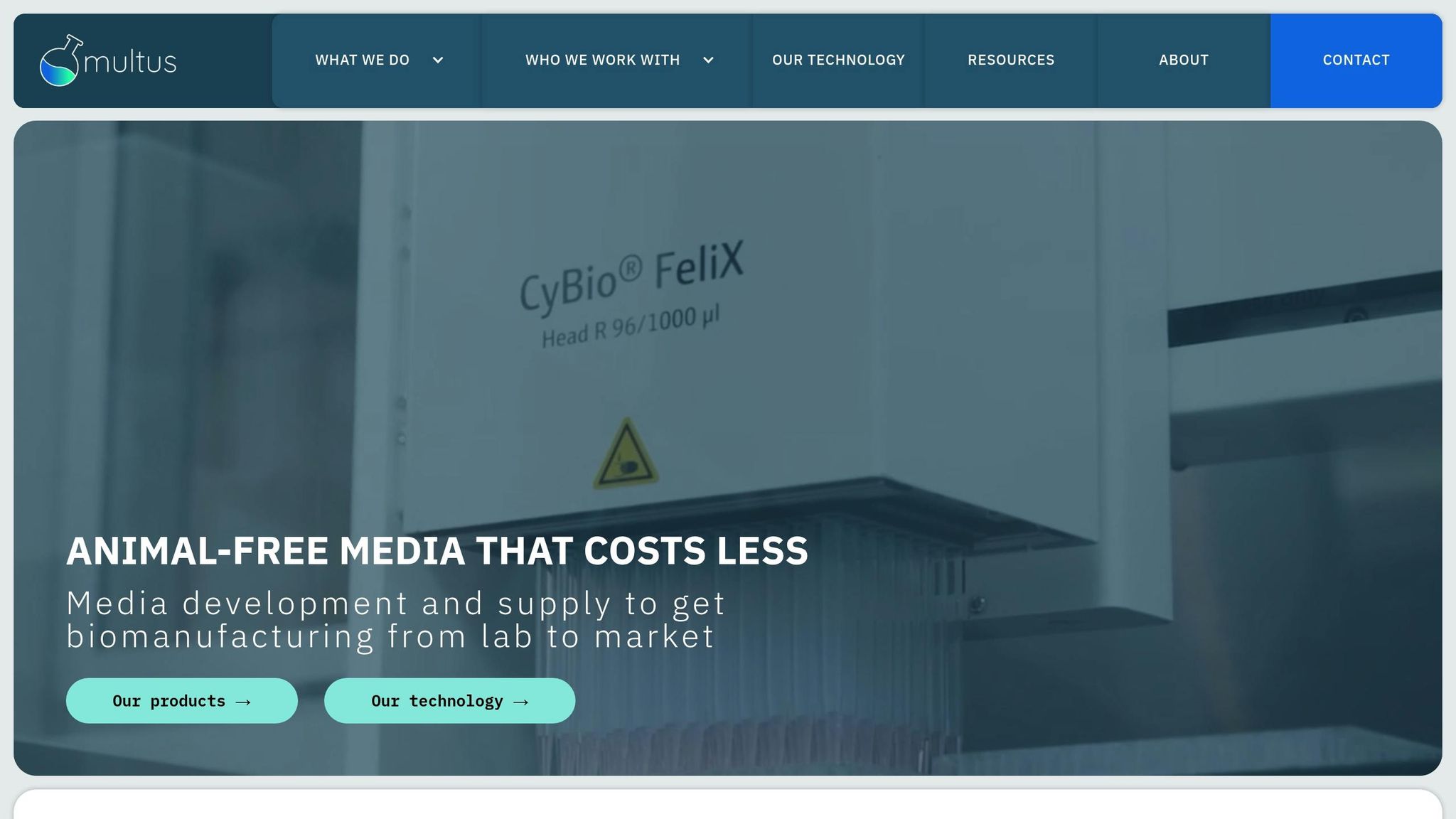The UK’s cultivated meat industry is tackling its biggest challenge: scaling production while cutting costs. Multus, a London-based biotech firm, and UCL, a leading research university, are collaborating to address these issues through their £1 million CULT-GRO project, co-funded by Innovate UK.
Here’s what you need to know:
- Multus specialises in growth media: They aim to reduce costs by replacing expensive, animal-derived components with plant-based alternatives.
- UCL focuses on research and scalability: Their expertise in bioprocessing and cell cultivation supports transitioning lab-scale production to industrial levels.
- Together, they’re developing solutions like serum-free media and edible scaffolding to make cultivated meat more affordable and accessible.
This partnership combines commercial and academic strengths to push the UK’s cultivated meat sector closer to large-scale production and market viability.
1. Multus

Multus is a biotechnology company addressing one of the biggest challenges in cultivated meat production: the high cost of growth media. Their focus is on creating more accessible and scalable solutions to drive progress across the cultivated meat industry.
Cutting Costs
Multus is revolutionising the way cell nutrition is approached by developing affordable media formulations. They replace costly animal-derived ingredients with more economical alternatives, ensuring that cell growth requirements are still met without breaking the bank.
Advancing Technology
In collaboration with University College London (UCL), Multus customises media formulations for different cell types. They also refine production processes to guarantee consistent quality at scale, making cultivated meat production more reliable and efficient.
Driving Industry Progress
By tackling cost and supply chain issues head-on, Multus helps producers concentrate on scaling their production efforts. Their work not only supports the cultivated meat sector but also complements UCL's research, creating a stronger foundation for the industry's growth.
2. UCL

University College London (UCL) is at the forefront of advancing biotechnology to support the growth of cultivated meat production. Their work bridges the gap between academic research and commercialisation, offering practical solutions for scaling up this innovative food technology. UCL’s collaboration with Multus highlights how academic expertise can fast-track progress in the cultivated meat industry.
Technology Development
UCL researchers focus on optimising cell lines and refining growth conditions to improve the efficiency of cultivated meat production. Their knowledge in bioprocessing engineering plays a key role, as they study how cells respond to various environments. This helps identify the best conditions for producing meat on a larger scale.
The university also provides cutting-edge analytical tools to measure cell growth rates, assess nutritional profiles, and monitor quality standards - factors that are critical for ensuring commercial success. Beyond these advancements, UCL addresses one of the biggest challenges in the field: scaling production effectively.
Scalability
Scaling up from lab experiments to industrial production is no small feat, and UCL scientists are tackling this head-on. They analyse how cells behave as they transition from small laboratory flasks to large industrial bioreactors, identifying the conditions needed for consistent and efficient growth.
In addition, UCL is working on standardising cultivation processes. This ensures that methods can be reliably replicated across different facilities, which is crucial for maintaining quality and consistency as production scales up for commercial use.
Industry Impact
UCL’s contributions have a tangible impact on the cultivated meat industry. By collaborating with Multus, they ensure that academic insights are translated into practical, commercial applications. Their work also supports regulatory efforts, providing the scientific data needed for safety assessments and approvals.
Beyond technology and research, UCL invests in the future by training a new generation of scientists and engineers. These graduates often transition into industry roles, bringing fresh expertise and innovative ideas to help propel the cultivated meat sector forward.
sbb-itb-c323ed3
Strengths and Weaknesses
The strengths and weaknesses of both Multus and UCL paint a clear picture of why collaboration is essential for tackling the challenges of scaling up Cultivated Meat production. Each brings unique capabilities to the table, and their partnership bridges critical gaps between commercial execution and academic research.
Multus leads in commercial execution. In January 2024, the company launched the world's first commercial-scale production facility for serum-free growth media, showcasing its ability to turn research into market-ready products [3]. Leveraging AI, Multus introduced DMEM/F12 food-grade basal media and Proliferum B - an animal-free alternative to FBS - in December 2024 [3]. However, reducing costs remains a steep challenge. Currently, a litre of liquid DMEM-F12 basal media costs around £40 without serum replacement. To achieve commercial viability, this cost needs to drop below £1 per litre, as growth media expenses account for over 80% of Cultivated Meat production costs [5][6].
UCL excels in interdisciplinary research. The university secured a Climate Crisis Pump Priming grant of £74,917.85 for the 2024–25 period to explore scalable solutions for Cultivated Meat production [2]. Through the Cellular Agriculture Manufacturing Hub (CARMA), the UK's largest cellular agriculture research initiative, UCL is addressing complex bioprocessing challenges that commercial players often cannot handle alone [4]. Their research includes developing novel biomaterials and edible scaffolds using natural ingredients like rice, chia, and alginate [2]. However, translating these academic breakthroughs into scalable, commercially viable processes requires strong industry partnerships.
| Criteria | Multus | UCL |
|---|---|---|
| Primary Strength | Commercial-scale production and AI-driven ingredient optimisation | Interdisciplinary scientific expertise |
| Key Challenge | Reducing media costs from £40/L to below £1/L | Converting academic research into scalable solutions |
| Technology Focus | FSSC22000-certified manufacturing and AI-driven systems | Biochemical engineering, biomaterials, and tissue engineering |
| Market Position | Market-ready products with established supply chains | Research foundation for future innovations |
| Resource Access | Commercial funding and industry partnerships | Academic grants and collaborative research networks |
This partnership exemplifies how Multus and UCL complement each other. Collaboration bridges these gaps. Multus offers the commercial infrastructure and manufacturing expertise necessary to scale UCL's innovative research. Meanwhile, UCL is laying the groundwork for next-generation solutions by developing low-cost, food-grade culture media using plant and seaweed-derived hydrogels [4]. The £1 million CULT-GRO project, co-funded by Innovate UK and involving Multus, Quest Meat, and UCL, is a prime example of this synergy [1]. Together, they are driving the advancement of Cultivated Meat production across the UK.
Conclusion
The collaboration between Multus and UCL marks a pivotal moment for the UK's Cultivated Meat sector, blending commercial expertise with academic precision to tackle production challenges head-on. Their £1 million CULT-GRO project - co-funded by Innovate UK and Quest Meat - focuses on creating a cell culture ingredients platform. This initiative addresses critical hurdles, such as finding alternatives to bovine serum and developing edible scaffolding systems that help stem cells grow into meat tissue [7][8][9].
This effort highlights the power of industrial-academic partnerships in driving innovation and scaling up production. Multus brings its manufacturing expertise and supply chain knowledge to the table, while UCL's Department of Biochemical Engineering offers cutting-edge research and thorough validation processes. Together, they are fast-tracking the journey from lab research to large-scale production.
For those interested in staying updated on Cultivated Meat advancements, platforms like Cultivated Meat Shop provide educational materials and early access opportunities. These resources showcase how collaborations like this one can turn a lab-based concept into a commercially viable product. This partnership serves as a model for the integrated approach needed to advance Cultivated Meat production in the UK.
FAQs
How are Multus and UCL working together to make cultivated meat more affordable?
The collaboration between Multus and UCL is centred on advancing biomanufacturing techniques and producing animal-free growth media. These advancements have led to a notable reduction in the cost of cultivated meat production, cutting expenses by as much as 55%.
By simplifying production processes and moving away from expensive traditional methods, this partnership is helping cultivated meat emerge as a more affordable and environmentally friendly alternative to conventional meat.
What challenges exist in scaling cultivated meat production, and how is UCL helping to overcome them?
Scaling up cultivated meat production from lab experiments to industrial manufacturing is no small feat. The process is riddled with challenges, including steep energy demands, expensive production techniques, and biological complexities such as fine-tuning growth media and achieving consistent taste and texture.
University College London (UCL) is addressing these obstacles head-on with cutting-edge bioprocessing advancements. Their work focuses on creating more economical cultivation methods and scalable technologies to make mass production a practical reality. Through partnerships with industry leaders, like the CULT-GRO project, UCL is working to dramatically cut costs and push the boundaries of cultivated meat production in the UK.
What breakthroughs are Multus and UCL making to replace animal-based components in growth media, and why are these innovations crucial for cultivated meat production?
Multus, in collaboration with UCL, is leading the way in creating animal-free growth media solutions. One standout development from Multus is Proliferum B, a product designed to replace the use of traditional fetal bovine serum (FBS) in cell cultivation. This approach supports effective cell growth without relying on animal-derived ingredients.
This breakthrough tackles some of the biggest hurdles facing the cultivated meat industry. It helps cut production costs, addresses ethical concerns tied to animal-derived components, and offers a more environmentally conscious alternative. By eliminating FBS - a costly and controversial ingredient - these advancements make cultivated meat more affordable and sustainable, clearing the path for broader adoption and future growth in the industry.













